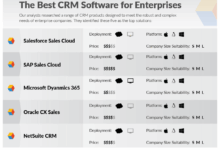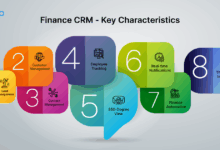Affordable CRM Software For Startups: The Key To Efficient Customer Management
Affordable CRM Software for Startups introduces a crucial tool for managing customer relationships effectively and optimizing business operations. Learn about the benefits, features, and integration capabilities in this comprehensive guide.
Introduction to Affordable CRM Software for Startups
Customer Relationship Management (CRM) software is a valuable tool for startups to effectively manage interactions with current and potential customers. It helps businesses streamline processes, improve customer satisfaction, and boost sales.
Benefits of Using CRM Software for Startups
- Centralized customer data for easy access and analysis
- Improved communication and collaboration among team members
- Automation of repetitive tasks to save time and increase efficiency
- Enhanced customer service and personalized marketing strategies
Popular CRM Software Options for Startups
- HubSpot CRM: Offers a free version with basic features, and affordable plans starting at $50 per month
- Zoho CRM: Provides a free version for up to 3 users, with paid plans starting at $12 per user per month
- Freshworks CRM: Offers a free trial with plans starting at $29 per user per month
Comparison of Pricing Plans for Selected CRM Software
| CRM Software | Key Features | Pricing | Customer Support |
|---|---|---|---|
| HubSpot CRM | Marketing automation, sales pipeline management | Starting at $50 per month | 24/7 customer support |
| Zoho CRM | Email integration, analytics, workflow automation | Starting at $12 per user per month | Phone and email support |
| Freshworks CRM | Contact management, lead scoring, email tracking | Starting at $29 per user per month | Online ticketing system |
Integrating CRM Software with Essential Tools for Startups
It is crucial for startups to integrate CRM software with other essential tools to maximize efficiency and productivity. This includes seamless integration with email marketing platforms like Mailchimp or project management tools such as Asana or Trello. By syncing these tools, startups can ensure a smooth flow of information and improve overall business performance.
Key Features to Look for in Affordable CRM Software
When choosing affordable CRM software for startups, it is crucial to consider key features that will help streamline your business operations and improve customer relationships. Here are some essential features to look for:
Contact Management
Effective contact management is essential for startups to keep track of customer interactions, preferences, and contact details. Look for CRM software that offers robust contact management capabilities, including the ability to segment contacts based on various criteria and easily access important information.
Lead Tracking
Lead tracking is vital for startups to monitor and nurture potential customers through the sales funnel. Choose a CRM software that provides lead scoring, lead assignment, and lead qualification features to help your sales team prioritize leads and convert them into customers effectively.
Email Integration
Email integration is crucial for startups to streamline communication with customers and prospects. Look for CRM software that offers seamless email integration, allowing you to send and track emails directly from the CRM platform. This feature can help improve efficiency and ensure timely follow-ups.
Customization Options
Customization options are essential for startups to tailor the CRM software to their specific needs. Look for software that allows you to customize fields, workflows, and reports to align with your business processes. This flexibility can enhance productivity and improve user adoption rates.
Pricing Plans and Scalability
When evaluating CRM software, consider the pricing plans and scalability options offered by different providers. Look for software that offers affordable pricing plans for startups with the flexibility to scale as your business grows. Ensure that the software can accommodate your growing customer base and evolving business needs.
User Interface and Ease of Use
A user-friendly interface is crucial for smooth adoption and training processes within your startup. Choose CRM software with an intuitive interface and easy-to-navigate features to ensure that your team can quickly learn and leverage the software. A user-friendly CRM platform can boost productivity and efficiency.
Reporting and Analytics Capabilities
Reporting and analytics capabilities are essential for startups to track performance, identify trends, and make data-driven decisions. Look for CRM software that offers robust reporting tools, customizable dashboards, and real-time analytics to help you monitor key metrics and optimize your business strategies.
Integrations with Other Tools
Consider CRM software that integrates seamlessly with other tools like marketing automation platforms for a more streamlined workflow. Integration with other business applications can enhance productivity, improve data accuracy, and provide a more holistic view of your customer interactions.
Customer Support Options
Lastly, consider the customer support options provided by CRM software vendors. Look for software that offers online resources, live chat support, or dedicated account managers to assist you with any technical issues or questions. Reliable customer support can ensure a smooth implementation process and ongoing success with the CRM software.
Integration Capabilities of CRM Software
When it comes to CRM software, one key aspect that startups should consider is its integration capabilities with other tools and platforms. Seamless integration can streamline business operations and improve overall efficiency.
Email Marketing Platforms Integration
Integrating CRM software with email marketing platforms allows startups to sync customer data, track interactions, and create targeted email campaigns based on customer behavior. This integration ensures a cohesive approach to customer engagement and helps in nurturing leads effectively.
- CRM software integration with email marketing platforms enables personalized communication with customers, leading to increased engagement and conversions.
- Automated workflows between CRM and email marketing tools help startups save time on manual data entry and ensure consistency in communication.
- Tracking email interactions within the CRM system provides valuable insights into customer preferences and helps in creating more targeted marketing strategies.
Significance of Seamless Integration with Existing Systems
For startups, seamless integration of CRM software with existing systems such as accounting software, e-commerce platforms, and customer support tools is crucial for maintaining data consistency and enhancing the overall customer experience.
- Integrating CRM software with accounting systems ensures accurate tracking of sales transactions and customer invoices, leading to improved financial management.
- Integration with e-commerce platforms enables startups to track customer interactions across multiple channels and provide personalized shopping experiences.
- Connecting CRM with customer support tools allows for quick access to customer information, leading to faster issue resolution and enhanced customer satisfaction.
Examples of Successful Integrations
Several startups have successfully integrated CRM software with various tools and platforms, resulting in significant improvements in business operations and customer relationships.
For instance, a startup integrated their CRM system with their e-commerce platform, allowing them to track customer behavior, personalize product recommendations, and improve sales conversions.
Another example is a startup that integrated CRM with their customer support software, enabling agents to access customer data instantly, leading to quicker response times and higher customer satisfaction rates.
User-Friendly Interface and Ease of Use
Having a user-friendly interface and ease of use are crucial factors when selecting a CRM software for startups. This ensures that even team members with limited technical expertise can navigate and utilize the software effectively. Let’s dive into the key aspects to consider in this regard.
Intuitive Design and Navigation
An intuitive design and easy navigation are essential for a user-friendly CRM software. Look for platforms that offer a clean interface with clearly labeled features and functions. This will help users quickly locate the tools they need without getting lost in a complex system.
Customization Options
Another important aspect is the ability to customize the CRM software to suit your specific business needs. Make sure the software allows you to tailor the layout, fields, and workflows according to your preferences. This flexibility ensures that the system adapts to your unique processes, making it easier for team members to work efficiently.
Training and Onboarding Support
When implementing a new CRM software, it’s crucial to have adequate training and onboarding support for your team. Look for platforms that offer tutorials, guides, and customer support to help team members get up to speed quickly. This will minimize any learning curve and ensure a smooth transition to the new system.
Mobile Accessibility
With the increasing trend of remote work, having mobile accessibility is a must-have feature in CRM software. Check if the platform offers a mobile app or responsive design that allows team members to access and update information on the go. This flexibility boosts productivity and ensures that team members can stay connected even when they’re not in the office.
Customization Options for Startup Needs
Customization plays a crucial role in tailoring CRM software to meet the specific needs of startups. By having customizable fields and workflows, startups can optimize their CRM software to align with their unique business processes.
Importance of Customizable Fields and Workflows
- Customizable fields allow startups to capture and organize data that is relevant to their business operations.
- Personalized workflows help streamline task management and ensure efficient processes within the CRM software.
Adapting to Changing Business Requirements
- CRM software offers flexibility in adapting to evolving business needs by allowing startups to modify fields, workflows, and configurations as needed.
- Startups can easily add or remove custom fields to accommodate new data requirements or changes in their business processes.
Creating Custom Fields and Workflows
- Startups can create custom fields in CRM software by defining the field type, label, and visibility settings to cater to specific data needs.
- Setting up personalized workflows involves mapping out the steps, triggers, and conditions for automated task management tailored to the startup’s operations.
Integrating Third-Party Tools and Plugins
- Startups can enhance the functionality of CRM software by integrating third-party tools or plugins for additional features like marketing automation, analytics, or communication tools.
Automating Routine Tasks and Streamlining Operations
- CRM software allows startups to automate routine tasks such as sending follow-up emails, scheduling appointments, or updating customer records to improve efficiency and productivity.
User Permissions and Access Levels
- Customizing user permissions and access levels in CRM software is essential for data security, ensuring that sensitive information is only accessible to authorized users within the startup.
Continuous Evaluation and Adjustment
- Startups should continuously evaluate and adjust CRM software configurations based on evolving business needs to ensure that the software remains optimized for their operations.
Data Security and Privacy Measures
In today’s digital age, data security and privacy are paramount concerns for businesses, especially startups utilizing CRM software. Implementing robust data security protocols is crucial to safeguard sensitive customer information and ensure compliance with regulations like GDPR.
Data Security Protocols
- Encryption: CRM software providers often utilize encryption techniques to protect data in transit and at rest, ensuring that sensitive information remains secure.
- Access Control: Implementing strict access controls helps limit the exposure of confidential data to authorized personnel only, reducing the risk of unauthorized access.
- Regular Audits: Conducting regular security audits and assessments can help identify vulnerabilities and ensure that data security measures are up to date.
Importance of GDPR Compliance
- GDPR compliance is essential for startups as it mandates strict guidelines for handling customer data, ensuring transparency and accountability in data processing.
- Non-compliance with GDPR can result in hefty fines and damage to the reputation of the startup, making it crucial to prioritize data protection and privacy.
Tips for Safeguarding Customer Information
- Educate Employees: Provide training to employees on data security best practices to prevent data breaches and ensure compliance with privacy regulations.
- Regular Updates: Keep CRM software up to date with the latest security patches and updates to address any vulnerabilities that could be exploited by cyber attackers.
- Data Minimization: Only collect and store customer data that is necessary for business operations, reducing the risk of exposure in case of a security breach.
Customer Support and Training Resources
Customer support and training resources are crucial for startups utilizing CRM software to ensure smooth implementation and optimal usage. Let’s explore the available options and best practices for leveraging these resources effectively.
Customer Support Options
- 24/7 live chat support for immediate assistance.
- Dedicated account manager for personalized support and guidance.
- Email support ticket system for tracking and resolving issues.
- Community forums for peer-to-peer support and knowledge sharing.
Training Resources and Documentation
- Video tutorials for visual guidance on software features and functionalities.
- Comprehensive user guides and manuals for reference and self-learning.
- Regular webinars and online training sessions for continuous skill development.
- Knowledge base with FAQs and troubleshooting tips for quick resolution of common issues.
Best Practices for Leveraging Customer Support
- Prioritize training sessions to onboard new team members effectively.
- Utilize customer support channels for clarifying doubts and optimizing CRM usage.
- Regularly update software to access new features and enhancements.
- Provide feedback to customer support for improving service quality and response time.
Mobile Accessibility and Remote Work Capabilities
Mobile accessibility and remote work capabilities are essential features for CRM software used by startups. In today’s fast-paced business environment, being able to access and manage customer data on the go is crucial for maintaining productivity and efficiency. Let’s explore how CRM software can support mobile accessibility and remote work capabilities.
Benefits of Mobile Accessibility
- Access to real-time customer data: Mobile CRM apps allow startup employees to access up-to-date customer information anytime, anywhere, enabling quick decision-making and personalized interactions.
- Improved communication: With mobile accessibility, team members can easily collaborate and communicate with each other, ensuring seamless coordination and efficient workflow.
- Enhanced customer service: Responding to customer queries and issues promptly is made possible through mobile CRM apps, leading to increased customer satisfaction and loyalty.
Benefits of Remote Work Capabilities
- Flexibility and work-life balance: Remote work capabilities provided by CRM software enable startup employees to work from anywhere, promoting a healthy work-life balance and increasing job satisfaction.
- Cost savings: By allowing remote work, startups can save on office space and related expenses, optimizing resources for business growth and development.
- Global talent acquisition: Remote work capabilities open up opportunities for startups to hire talent from different geographical locations, leading to a diverse and skilled workforce.
Examples of Mobile CRM Apps
- HubSpot CRM: Offers a mobile app that provides access to customer data, communication tools, and task management features, enhancing collaboration and productivity.
- Salesforce Mobile: Allows users to view and update customer records, track sales opportunities, and manage tasks on the go, empowering sales teams to stay connected and efficient.
- Zoho CRM: Provides a mobile app with features such as lead management, contact insights, and deal tracking, enabling startup employees to engage with customers effectively from anywhere.
Reporting and Analytics Tools
Reporting and analytics tools play a crucial role in CRM software by providing insights into customer interactions and performance metrics. These tools help businesses track and analyze data to make informed decisions and improve customer relationships.
Key Performance Indicators (KPIs)
- Customer Acquisition Cost (CAC)
- Customer Retention Rate
- Sales Conversion Rate
- Customer Lifetime Value (CLV)
- Net Promoter Score (NPS)
Creating Custom Reports and Dashboards
To create custom reports and dashboards in CRM software:
- Identify the key metrics you want to track.
- Select the data sources and set up data connections.
- Choose the visualization type (bar graph, pie chart, etc.)
- Customize the layout and design of the report or dashboard.
- Save and share the custom report with relevant team members.
Comparison of Reporting and Analytics Tools
Different reporting and analytics tools in the market cater to various business sizes and industries. Some popular tools include:
– Tableau: Great for data visualization and easy-to-use interface.
– Power BI: Offers advanced analytics capabilities and integration with Microsoft products.
– Google Data Studio: Free tool with strong data visualization features.
Data Visualization for Decision-Making
Data visualization techniques, such as charts, graphs, and heat maps, can enhance the understanding of CRM analytics for decision-making. For example, a sales pipeline visualization can help identify bottlenecks in the sales process and prioritize leads effectively.
Scalability and Growth Potential
Scalability is a crucial factor for startups when choosing CRM software, as the business is expected to grow rapidly over time. Let’s explore how CRM software can adapt to the evolving needs of a startup and facilitate seamless growth.
Scalability Options Offered by CRM Software Providers
- CRM software providers should offer scalable solutions that can accommodate the increasing data and customer interactions of a growing startup.
- Look for options to easily upgrade or add features as the business expands, without disrupting daily operations.
- Ensure the CRM software can handle a larger user base and growing customer database without performance issues.
Successful Transitions to Larger CRM Systems
- Provide examples of startups that smoothly transitioned from a basic CRM system to a more comprehensive one as they scaled their operations.
- Highlight how the new CRM system improved efficiency, productivity, and customer satisfaction for these businesses.
- Discuss the challenges faced during the transition and how they were overcome to achieve successful implementation.
Pricing Structures and Budget Alignment
- Compare the pricing models of different CRM software providers to find one that aligns with the budget constraints of a growing startup.
- Look for flexible pricing plans that can accommodate increasing users and data volume without significant cost spikes.
- Consider the total cost of ownership, including implementation, training, and ongoing support, when evaluating the affordability of CRM software.
Migrating Data to a More Robust CRM System
- Create a step-by-step guide on how to migrate data from a smaller CRM system to a more robust one as the business scales.
- Highlight the importance of data integrity, security, and minimal downtime during the migration process.
- Discuss the best practices for transferring data seamlessly to ensure a smooth transition without loss or corruption of important information.
Importance of Scalability Features in CRM Software
- Illustrate how specific scalability features in CRM software, such as customizable workflows, automation, and integrations, can support an expanding customer base.
- Explain how these features enable startups to streamline processes, improve customer relationships, and scale operations efficiently.
- Highlight real-life examples of businesses that leveraged scalability features to manage rapid growth and meet increasing demands.
Case Studies and Success Stories
Implementing affordable CRM software can have a significant impact on the growth and success of startups. Let’s explore real-life examples of startups that have benefited from using CRM solutions.
Startup A: E-commerce Company
- Startup A faced challenges in managing customer data and tracking sales effectively before implementing CRM software.
- After integrating CRM software, the company saw a 30% increase in sales and a 20% improvement in customer retention.
- The key features that contributed to Startup A’s success were the automated lead management system and personalized customer communication tools.
Startup B: SaaS Company
- Startup B struggled with disorganized customer communication and inefficient sales processes prior to CRM implementation.
- With CRM software in place, Startup B experienced a 25% increase in sales conversion rates and a 15% reduction in response time to customer inquiries.
- The customizable dashboard and reporting tools of the CRM software played a crucial role in improving Startup B’s efficiency and productivity.
Startup C: Service Industry
- Startup C grappled with manual data entry and lack of centralized customer information before adopting CRM software.
- After utilizing CRM software, Startup C witnessed a 40% improvement in customer service satisfaction and a 35% decrease in lead response time.
- The integration capabilities and mobile accessibility of the CRM software were instrumental in streamlining Startup C’s operations and enhancing customer experience.
Comparison of Affordable CRM Software Options
When choosing a CRM software for your startup, it’s essential to consider various options available in the market. Here, we will compare different affordable CRM software solutions based on key features, pricing, and reviews to help you make an informed decision.
Salesforce Essentials
Salesforce Essentials is a popular CRM software known for its robust features and scalability. It offers a wide range of tools for sales, marketing, and customer service. However, the pricing can be on the higher side for startups with a limited budget.
HubSpot CRM
HubSpot CRM is a user-friendly software that provides essential CRM features for startups. It offers a free version with basic functionalities, making it a cost-effective option. However, some advanced features may require a paid subscription.
Zoho CRM
Zoho CRM is another affordable option that caters to startups with its customizable features and reasonable pricing plans. It provides a good balance between functionality and cost. However, some users may find the interface slightly outdated.
Pipedrive
Pipedrive is a CRM software focused on sales management, making it ideal for startups looking to streamline their sales processes. It offers a visual pipeline system and integration capabilities with other tools. On the downside, it may lack some advanced features compared to other options.
Recommendations
Based on specific startup requirements and budget constraints, HubSpot CRM stands out as a cost-effective option for startups looking for essential CRM features without breaking the bank. However, if scalability and advanced features are a priority, Salesforce Essentials or Zoho CRM could be better suited for your needs.
Tips for Choosing the Right CRM Software
When selecting CRM software for your startup, it’s crucial to consider various factors to ensure you choose the right fit for your business needs. Here are some tips to guide you through the process:
Define Your Requirements Clearly
Before researching CRM options, outline your specific requirements, such as the number of users, features needed, budget constraints, and integration capabilities. This will help you narrow down your choices and focus on solutions that align with your startup’s goals.
Consider Scalability and Growth Potential
Opt for CRM software that can scale with your business as it grows. Look for a solution that offers flexibility and can accommodate additional users, features, and data storage as your startup expands. Scalability is essential to avoid outgrowing your CRM system too quickly.
Evaluate Integration Capabilities
Ensure that the CRM software you choose integrates seamlessly with other tools and platforms your startup uses, such as email marketing software, accounting systems, or e-commerce platforms. Smooth integration will streamline workflows and enhance overall efficiency.
Prioritize User Experience and Ease of Use
Choose a CRM system with an intuitive interface and user-friendly design. A system that is easy to navigate and requires minimal training will encourage adoption among your team members, leading to higher productivity and engagement with the software.
Seek Demos and Trials
Before making a final decision, request demos and trial periods from CRM vendors to test the software’s functionality and suitability for your startup. Gather feedback from different team members who will be using the CRM to ensure it meets their needs and preferences.
Collect Feedback from Users
Involve your team in the decision-making process by collecting feedback on the CRM software options you are considering. Their input can provide valuable insights into how well the software aligns with their daily tasks and workflows, helping you make an informed choice.
Set a Realistic Budget
Establish a budget for your CRM software investment and stick to it. Consider both upfront costs and ongoing expenses, such as maintenance fees and additional user licenses. Choose a solution that offers the best value for your money without compromising on essential features.
Focus on Data Security and Privacy
Prioritize CRM systems that prioritize data security and privacy measures to protect sensitive customer information. Look for encryption protocols, secure cloud storage, and compliance with data protection regulations to safeguard your startup’s data.
Consider Customer Support and Training Resources
Select a CRM vendor that provides robust customer support and training resources to assist your team during implementation and ongoing use of the software. Reliable support services can help resolve issues quickly and ensure a smooth transition to the new system.
Future Trends in CRM Software for Startups
In today’s fast-paced business environment, startups are constantly looking for ways to streamline their processes and improve customer relationships. The future of CRM software for startups is evolving rapidly, with emerging technologies and trends shaping the way businesses interact with their customers. Let’s explore some of the key trends that are likely to impact CRM software for startups in the coming years.
Impact of AI, Automation, and Predictive Analytics
AI, automation, and predictive analytics are revolutionizing the way startups manage customer relationships. By leveraging these technologies, startups can gain valuable insights into customer behavior, automate repetitive tasks, and predict future trends. This can help startups personalize their interactions with customers, improve efficiency, and drive growth.
- AI-powered chatbots can provide instant customer support, answering queries and resolving issues in real-time.
- Automation tools can streamline marketing campaigns, lead management, and sales processes, saving time and resources for startups.
- Predictive analytics can forecast customer preferences and buying patterns, enabling startups to proactively address customer needs.
Adopting Innovative CRM Solutions
To stay ahead of the competition, startups need to embrace innovative CRM solutions that offer advanced features and functionalities. By choosing the right CRM software, startups can optimize their customer relationships, improve productivity, and drive business growth.
- Cloud-based CRM systems provide startups with flexibility, scalability, and cost-effectiveness, allowing them to access data from anywhere at any time.
- Mobile CRM applications enable startups to stay connected with customers on the go, enhancing communication and collaboration.
- Integrating social media platforms with CRM software can help startups engage with customers on multiple channels and gather valuable feedback.
Implementing a CRM Strategy
Startups looking to implement a CRM strategy should follow a step-by-step approach to ensure successful implementation and adoption. By defining their goals, selecting the right CRM software, training employees, and continuously monitoring and optimizing their CRM strategy, startups can enhance customer relationships and drive business growth.
- Define clear objectives and KPIs to measure the success of your CRM strategy.
- Choose a CRM software that aligns with your startup’s specific needs and budget constraints.
- Provide comprehensive training to employees to ensure they understand how to use the CRM software effectively.
- Regularly review and analyze data to identify trends, opportunities, and areas for improvement in your CRM strategy.
Last Word
In conclusion, Affordable CRM Software for Startups offers a cost-effective solution for startups to streamline their customer management processes and drive growth. Explore the possibilities and take your business to the next level with the right CRM software.




